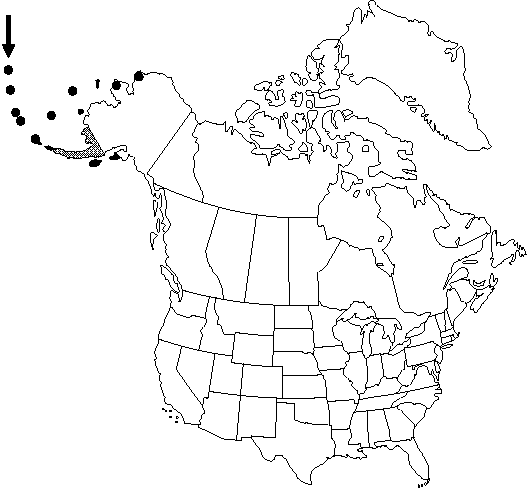Papaver radicatum subsp. alaskanum
Fl. Alaska, 244, fig. 517. 1959.
Plants loosely to densely cespitose, to 1.8 dm, with abundant long-lanceolate, acuminate, dull to shiny, persistent leaf bases. Leaves to 10 cm; petiole to 3/4 length of leaf; blade green on both surfaces, lanceolate, with 2-4 pairs of primary lateral lobes; primary lobes lanceolate to obovate, apex acute to rounded. Inflorescences: scapes curved or straight, sparingly to densely hispid, trichomes appressed-ascending to spreading, light to dark brown. Flowers to 6.5 cm diam.; petals yellow, occasionally pink tinged (w Aleutians). Capsules subglobose to obovoid-obconic, to 1.5 cm, strigose, trichomes light to dark brown, base abruptly expanded. The chromosome number (2n = 42) attributed to G. Knaben (1959) by U. Rändel (1977) cannot be confirmed.
Phenology: Flowering Jun–Aug.
Habitat: Sands and gravels and on rocky tundra
Elevation: 0-100 m
Distribution

Alaska, Asia (Russian Far East, Kamchatka).
Discussion
In the flora area, Papaver radicatum subsp. alaskanum is known from Kodiak Island, the Kenai Peninsula, the islands of the Bering Sea, the Aleutian Islands, the coastal Alaska Peninsula and Bristol Bay region, and disjunct northward in Alaska to the Chukchi Sea.
We distinguish these coastal plants from the ones at high elevations in the interior of Alaska and Yukon that also have numerous persistent leaf bases and have been named Papaver alaskanum by others (cf. E. Hultén 1968; S. L. Welsh 1974) but otherwise have the features of P. radicatum subsp. radicatum or subsp. kluanensis. Specimens of P. radicatum subsp. alaskanum with short, broad capsules and light-colored trichomes approach, in these respects, the Asiatic P. microcarpum, a similarity that Tolmatchew has already indicated with his combination P. microcarpum subsp. alaskanum.
Selected References
None.